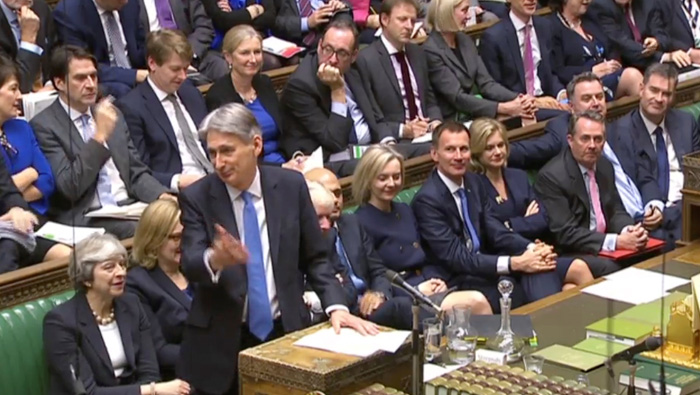
London: Britain slashed its growth forecasts for its Brexit-bound economy and expects to borrow sharply more going into the next decade, finance minister Philip Hammond said on Wednesday as he delivered a gloomy budget statement in parliament.
Slower economic growth will mean lower tax revenues, giving Hammond little room for the bold moves that many in his Conservative Party - still smarting from an election mauling in June - are demanding to help households after years of cuts in public spending.
Hammond said he was taking a balanced approach to steering Britain's economy through the next few years when it will face the challenge of leaving the European Union.
"We understand the frustration of families where real incomes are under pressure," he said, acknowledging high inflation and weak wage growth. He pointed to forecasts that unemployment will continue to fall. But he also said the war chest he wants to keep in reserve to help the economy would almost halve in size because of the weak outlook for the economy.
Hammond said Britain's budget forecasters now expect gross domestic product will grow by 1.5 per cent in 2017, compared with a forecast of 2.0 per cent made in March, reflecting a slowdown this year as last year's Brexit vote weighed on the economy.
The Office for Budget Responsibility saw growth in 2018 at 1.4 per cent, lower than its previous forecast of 1.6 per cent, Hammond told parliament. The revisions for later years were more acute - GDP growth forecasts in 2019 and 2020 stood at 1.3 per cent in both years compared with 1.7 and 1.9 per cent respectively seen in March.
The OBR had been expected to take a gloomier view on the economy after it said in October that it would lower its projections for productivity growth in the years ahead. By 2021 and 2022, growth was seen picking up only slightly to 1.5 and 1.6 per cent respectively.
Many lawmakers had called on Hammond to produce a bold budget to turn around the fortunes of Prime Minister Theresa May who lost her parliamentary majority in a failed election gamble in June, is struggling to make headway in Brexit negotiations with the EU and recently lost two ministers from her cabinet.
As well lower tax revenues, slower growth will add to the challenge of turning Britain's budget deficit into a surplus by the mid-2020s. Hammond said the OBR now expected Britain would borrow more in the coming years.
Britain is expected to run a budget deficit of 1.3 per cent of GDP by the 2021/22 financial year, almost double the previous estimate of 0.7 per cent. Before last year's Brexit vote, Britain had been aiming to post a budget surplus by the end of this decade.
The lower growth outlook meant Hammond would have less money in reserve to help Britain's economy as it copes with leaving the EU, and possibly to help his Conservative Party's prospects ahead of the next election, which is scheduled for 2022.
Hammond said his so-called "fiscal headroom" - taking into consideration his budget targets - now stood at 14.8 billion pounds, almost half the 26 billion pounds expected in March.